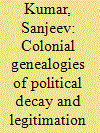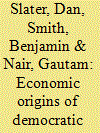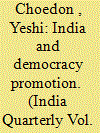|
|
|
Sort Order |
|
|
|
Items / Page
|
|
|
|
|
|
|
| Srl | Item |
| 1 |
ID:
172319


|
|
|
|
|
| Summary/Abstract |
This article is an attempt to conceptualise and theoretically explain the colonial genealogies of the processes of state-making and state-construction in post-colonial South Asia. In pursuit of this, the article seeks to theorise the colonial ways of providing a sense of fixity of political territoriality, held together by colonially crafted institutions of metropolitan governance, as an independent variable in determining the nature of the processes of state-making and state-construction in the region. On this count, an enquiry into the complex trajectory of these post-colonial political processes, which are the dependent variables for this article, is the fundamental problematic of analysis. This problematic would be decoded with the help of a dual conceptual framework, involving what Samuel Huntington designates as political decay and the legitimation crisis given by Jurgen Habermas. In the context of South Asia, the predicaments of political decay and legitimation crisis, according to this article, manifest as after-effects of engagement on the part of the region’s post-colonial polities with the imported values of colonial modernity and neoliberal economic reforms. By drawing instances from two countries of the Indian subcontinent, Pakistan and Bangladesh, the article tries to show how these after-effects have played out in the form of a tumultuous political history of the processes of state-making and state-construction. The article, in this way, is an attempt to theorise the inter-sectionalities between the colonial and post-colonial periods of South Asia. This has been done here by problematising such a historical inter-sectionality from the perspective of the two intervening variables—the received values of colonial metropolis and the morals of modernity—mediated through neoliberal economic reforms.
|
|
|
|
|
|
|
|
|
|
|
|
|
|
|
|
| 2 |
ID:
132974


|
|
|
|
|
| Publication |
2014.
|
| Summary/Abstract |
From Aristotle to Acemoglu and Robinson, scholars have argued that democracy possesses powerful redistributive impulses, and imperils itself accordingly. We challenge the validity of the redistributive model of democratic breakdown in the postcolonial world-the only cases where democracies have collapsed since World War II-because its assumptions regarding state power are questionable or even inapplicable in postcolonial settings. Our correlative analysis of cross-sectional time series data from 139 countries between 1972 and 2007 indicates that, contrary to the expectations of the redistributive model, redistributive taxation is negatively associated with the incidence of military coups and the likelihood of democratic breakdown. Furthermore, authoritarian takeovers do not appear systematically to result in reduced redistribution from the rich. More fine-grained historical evidence from Southeast Asia-a region where the redistributive model should be especially likely to hold true-further affirms that authoritarian seizures of power are neither inspired by successful redistributive policies nor followed by their reversal. Taken together, these quantitative and qualitative data offer significant support for our central theoretical claim: contemporary democratic breakdowns have political origins in weak states, not economic origins in class conflict.
|
|
|
|
|
|
|
|
|
|
|
|
|
|
|
|
| 3 |
ID:
138866


|
|
|
|
|
| Summary/Abstract |
When the Western countries confronted backlash in their promotion of democracy, they wooed India to join them. India has shown reluctance to join them due to various factors. It starts with discussion of how it was inconceivable for India to promote democracy during the Cold War and then examine factors that made India reticent to commit itself to democracy promotion in the post-Cold War. The paper discusses the reasons as to why a nuanced shift towards supporting democracy promotion has taken place in the turn of the Century and how this shift is made with the intention of making a difference through participation rather than openly protesting and standing aloof on principle ground. The main focus of the paper is to highlight how India provides democracy assistance differently from that of the Western countries and what kind of tangible assistances India provided to those who sought. It highlights how, keeping in view the sensitivity of sovereignty among the developing countries, India uses term such as ‘democracy assistance’ or ‘democracy support’ instead of ‘democracy promotion’ and how it adopts policy of providing democracy assistance only when requested and it follows top-down approach, dealing mainly with the sovereign states and their institutions. It ends with an emphasis on the value addition of having diverse approaches to spreading democracy.
|
|
|
|
|
|
|
|
|
|
|
|
|
|
|
|
|
|
|
|
|